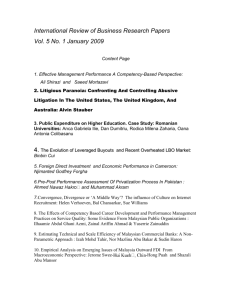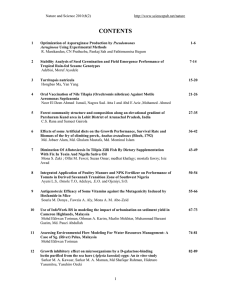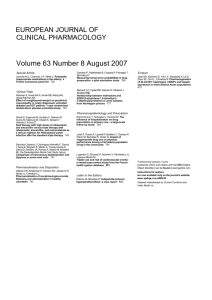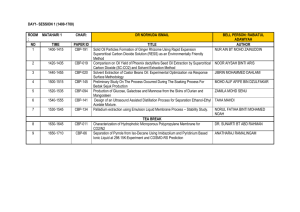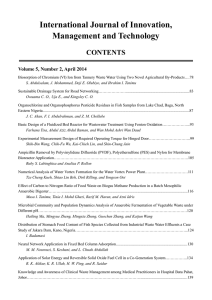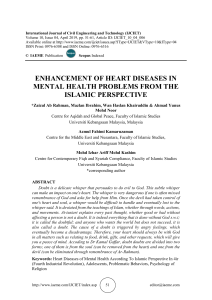EXPLORING FACTORS IMPACTING OF SOUL INTERRUPTION BY ISLAMIC PERSPECTIVE
advertisement
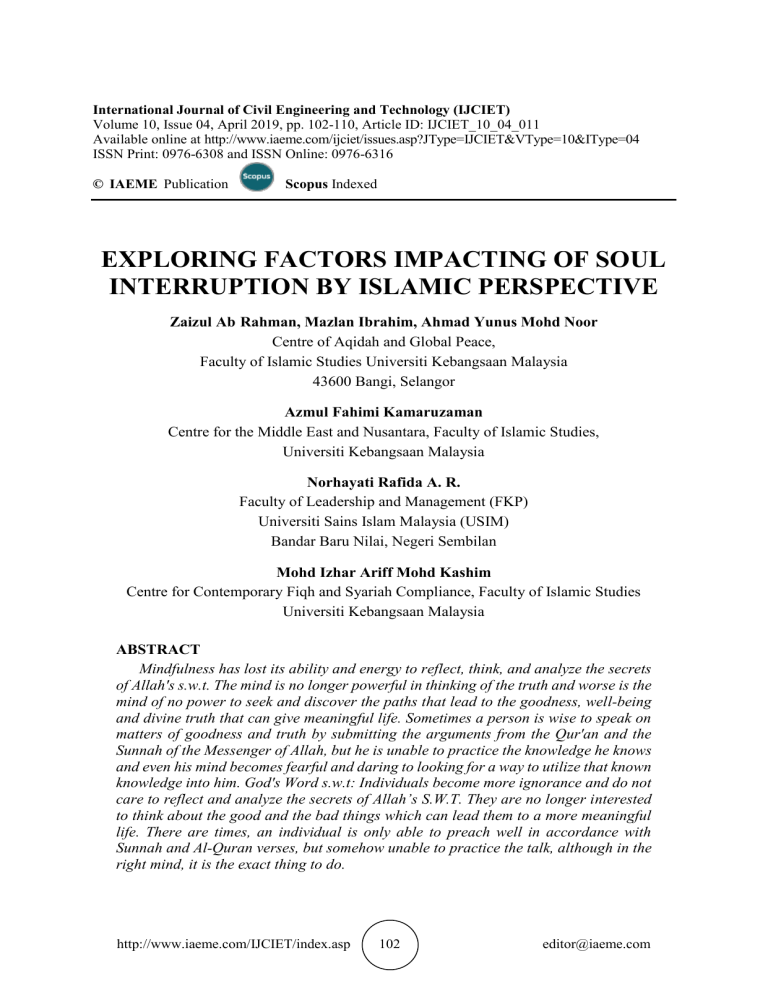
International Journal of Civil Engineering and Technology (IJCIET) Volume 10, Issue 04, April 2019, pp. 102-110, Article ID: IJCIET_10_04_011 Available online at http://www.iaeme.com/ijciet/issues.asp?JType=IJCIET&VType=10&IType=04 ISSN Print: 0976-6308 and ISSN Online: 0976-6316 © IAEME Publication Scopus Indexed EXPLORING FACTORS IMPACTING OF SOUL INTERRUPTION BY ISLAMIC PERSPECTIVE Zaizul Ab Rahman, Mazlan Ibrahim, Ahmad Yunus Mohd Noor Centre of Aqidah and Global Peace, Faculty of Islamic Studies Universiti Kebangsaan Malaysia 43600 Bangi, Selangor Azmul Fahimi Kamaruzaman Centre for the Middle East and Nusantara, Faculty of Islamic Studies, Universiti Kebangsaan Malaysia Norhayati Rafida A. R. Faculty of Leadership and Management (FKP) Universiti Sains Islam Malaysia (USIM) Bandar Baru Nilai, Negeri Sembilan Mohd Izhar Ariff Mohd Kashim Centre for Contemporary Fiqh and Syariah Compliance, Faculty of Islamic Studies Universiti Kebangsaan Malaysia ABSTRACT Mindfulness has lost its ability and energy to reflect, think, and analyze the secrets of Allah's s.w.t. The mind is no longer powerful in thinking of the truth and worse is the mind of no power to seek and discover the paths that lead to the goodness, well-being and divine truth that can give meaningful life. Sometimes a person is wise to speak on matters of goodness and truth by submitting the arguments from the Qur'an and the Sunnah of the Messenger of Allah, but he is unable to practice the knowledge he knows and even his mind becomes fearful and daring to looking for a way to utilize that known knowledge into him. God's Word s.w.t: Individuals become more ignorance and do not care to reflect and analyze the secrets of Allah’s S.W.T. They are no longer interested to think about the good and the bad things which can lead them to a more meaningful life. There are times, an individual is only able to preach well in accordance with Sunnah and Al-Quran verses, but somehow unable to practice the talk, although in the right mind, it is the exact thing to do. http://www.iaeme.com/IJCIET/index.asp 102 editor@iaeme.com Zaizul Ab Rahman, Mazlan Ibrahim, Ahmad Yunus Mohd Noor, Azmul Fahimi Kamaruzaman, Norhayati Rafida A. R. and Mohd Izhar Ariff Mohd Kashim Keywords: Effects Of Soul Interruption By Islamic Perspective, Adolescents, Problematic Behaviors, Psychology of Religion Cite this Article: Zaizul Ab Rahman, Mazlan Ibrahim, Ahmad Yunus Mohd Noor, Azmul Fahimi Kamaruzaman, Norhayati Rafida A. R. and Mohd Izhar Ariff Mohd Kashim, Exploring Factors Impacting of Soul Interruption by Islamic Perspective., International Journal of Civil Engineering and Technology, 10(04), 2019, pp. 102–110 http://www.iaeme.com/IJCIET/issues.asp?JType=IJCIET&VType=10&IType=04 1. EFFECTS OF SOUL INTERRUPTION Why do you call on others to do good, when you ignore yourself, when you read the Bible, why do not you think? (Al-Baqarah 2: 44) Disobedience to Allah S.W.T will cause the mind to be disturbed. This is because God will keep his Guidance away. The individual will become fragile and vulnerable. Scholars of the Salaf stated that no one is capable of disobeying Allah S.W.T but himself who intends to deviate. The mind of a healthy individual will be able to restrain himself from evil because the consciousness of being constantly observed by Angels who has been ordered by Allah S.W.T. Based on the Islamic perspective, bad attitudes and actions will cost an individual to lose the “light of Guidance” (Sagir, A. (2011); Susanti (2011); Razali, W. M. (2011); Zaizul et al 2018). This will create distance between that individual and God. Among the signs indicating an individual losing the “light of Guidance” are: a) The soul is incapable of making themselves closer to the potential of muthmainnah (calmness, peace, and manners), the potency of radhiyah (the meritai) and the potential of mardhiyah (the best). God's Word s.w.t: Verily, those who have purified their souls have been successful, and verily there have been those who have defiled it. (Ash-Shams 91: 9-10) The above verse explains that the individuals who receive and adhere to Allah’s law are successful compared to the others who go against it. a) Mindfulness has lost its ability and energy to reflect, think, and analyze the secrets of Allah's s.w.t. The mind is no longer powerful in thinking of the truth and worse is the mind of no power to seek and discover the paths that lead to the goodness, well-being and divine truth that can give meaningful life. Sometimes a person is wise to speak on matters of goodness and truth by submitting the arguments from the Qur'an and the Sunnah of the Messenger of Allah, but he is unable to practice the knowledge he knows and even his mind becomes fearful and daring to looking for a way to utilize that known knowledge into him. God's Word s.w.t: b) Individuals become more ignorance and do not care to reflect and analyze the secrets of Allah’s S.W.T. They are no longer interested to think about the good and the bad things which can lead them to a more meaningful life. There are times, an individual is only able to preach well in accordance with Sunnah and Al-Quran verses, but somehow unable to practice the talk, although in the right mind, it is the exact thing to do. Allah S.W.T’s word: Why do you call on others to do good, when you ignore yourself, when you read the Bible, why do not you think? (Al-Baqarah 2: 44) Disobedience to Allah S.W.T will cause the mind to be disturbed. This is because God will keep his Guidance away. The individual will become fragile and vulnerable. http://www.iaeme.com/IJCIET/index.asp 103 editor@iaeme.com Exploring Factors Impacting of Soul Interruption by Islamic Perspective Scholars of the Salaf stated that no one is capable of disobeying Allah S.W.T but himself who intends to deviate. The mind of a healthy individual will be able to restrain himself from evil because the consciousness of being constantly observed by Angels who has been ordered by Allah S.W.T. A healthy mind will realize that happiness, satisfaction, and beauty of life is simple by seeking the blessing of Allah S.W.T. The joy of life and peace of mind will be obtained once an individual receive the blessing from Allah S.W.T. Once Qalbu (soft-hearted) has lost the ability to receive and accomodate guidance, it can not digest about the verses and secrets of divine divinity. The dead heart begins to give less, intolerance, and unkindness and will be filled with ruthless and bad attitudes. In their hearts there is a disease, then God adds the disease to them; and for them it is a grievous torment because of what they used to deny. (Al-Baqarah 2: 10) Never, but what they always do has closed their hearts. (Al-Muthafifin 83: 14) c) Senses lose the ability to understand the contents of Al-Quran and the things that happen in it. For example, eyes to see, ears to hear, nose to smell and so on. Furthermore, things that cannot be seen and understand with naked eyes, halal and haram, demons, jinns, angels and Allah S.W.T. God's Word s.w.t:Allah has closed their hearts and ears, and their eyes are closed;and they have a great torment. (AlBaqarah 2: 7) d) The body loses its ability and energy to stand firm in upholding the true goodness, truth, and wellbeing; but the body is very strong in upholding the activities of damage, destruction, and fraud. e) An individual is more directed at doing bad things and damages. He is incapable of restraining himself to do and to uphold the truth. An individual who is full of sin to his Almighty will suffer bad things in their lives. For an example, if there are some sinful people in an organization or a household, the organization will be in a mess. Destruction, damage, robbery, fraud, crime and many more cases will arise apart from this. 2. MENTAL AND MORAL DAMAGE WILL LEAD TO A GREATER DESTRUCTION TO THE COMMUNITY Mental and moral damage will lead to a greater destruction to the community, regardless of whether to the large groups, small groups, family systems, administrations or a nation Gursoy, F. et al (2012). The situation can be seen and understood through past events (Ryff, C.D. (1989) such as: a) What caused the devil to be cursed and expelled from the kingdom of heaven; and it turns out to be the worst form and terrible; even the inner state that turned into worse and more horrible; mercy is replaced with a curse, beautifully replaced with ugly, heaven replaced with hell, faith replaced by kufur, in connection with a commendable leader into an ugly and troublesome thing; the sound of tasbih, tahmid and tahlil is replaced by the decorations of disbelief, hypocrisy, fraud and abomination; the ornament of faith is replaced by the decorations of disbelief, wickedness and disobedience; so that he is by Allah as the most despicable creature. Its position falls at the lowest level. He is entitled to the wrath of Allah and to perish. The most severe punishment of Allah is to him to be the leader of the wicked, the sinner and he is willing to be their leader. http://www.iaeme.com/IJCIET/index.asp 104 editor@iaeme.com Zaizul Ab Rahman, Mazlan Ibrahim, Ahmad Yunus Mohd Noor, Azmul Fahimi Kamaruzaman, Norhayati Rafida A. R. and Mohd Izhar Ariff Mohd Kashim b) What caused the wind to control the Ad so that they died lying on the surface of the earth like the stumps of palm trees that had fallen; the wind hunted their houses, rice fields, fields and their livestock. c) What caused Allah to send clouds of torment; which the cloud was an umbrella that protected the Prophet Shuaib, but the cloud dumped the blazing fire upon the heads of those who opposed it. d) What caused Allah to drown Fir'aun together with his people in the middle of the sea, then their spirits were transferred to hell; their bodies were drowned while the spirit were burned. e) Why God sinks Qarun, his palace, his possessions, and his family so evenly on the surface of the earth 3. HOW MORAL AND MENTAL DAMAGES AFFECTS To learn more about how moral and mental damages affects to an individual, family, or a nation, this can be done by reading and studying the history of Muslims and the previous civilization Wood, D.J. (1991); Gursoy, F. 2012; Connor, K.M., (2003) Fredrickson, B.L. (2001); Mohd Noor, A. Y et al 2017). Detailed information can be obtained through deep reading from the beginning of the period until the time of destruction. Muslim scholars view that today’s Muslims are in a difficult situation to be distinguished (Mohd Noor, A. Y. et al 2012, 2017, 2018): a) Who is the scholar and who is non-scholar because some of them do not show a strong mental, physical and moral development. b) Who are the real leaders and who are bad leaders; as part of their efforts to develop a nation should be praised, respected and exemplified by the people or any other country. c) Who are the real friends and who are foes; as both groups are mutually suspicious, accuse each other, defame, rebellious, and uncivilized, although they are all educated people. d) Smuggling, prostitution, gambling, and fraud are widespread, and the worst part it has become part of everyday life. Murder and domination are also threatening, that it is no longer a shameful thing even become a symbol of pride and strength, which actually can lead to destruction and corruption. f) Economic and political situation cannot be restored and developed as expected by the people. The law has no immunity, and justice is no longer in power. g) The increase of natural disasters show that nature has been unable to withstand the burden of sin by the caliphs which was given trust by Allah S.W.T. 4. CONCLUSION If viewed at the current state, it is the same as the previous state. This should be a warning to God's punishment. God's punishment is heavy and unbearable. At this point, the mind think and heart starts to worry and troubled if they are not addressed. Allah and the angels will bring the punishment at anytime as it has been done before. For example, river water overflowed and drowned buildings, towns and villages. Volcano erupts, wind and hurricanes that sweep the whole life. Someone will not be able to escape the destruction and punishment of God. The impact of the damaged soul has had a great impact not only on the individual but also on families, communities, and countries (Hackmann, A. et al; 2011; Hermann, H., et al; 2011; Meichenbaum, D. et al 2011; Mohd Noor, A. Y et al 2017). Therefore, this problem should be a major concern for Islamic scholars to prevent the destruction and damage that can ruin the generation of the nation. http://www.iaeme.com/IJCIET/index.asp 105 editor@iaeme.com Exploring Factors Impacting of Soul Interruption by Islamic Perspective 5. ACKNOWLEDGEMENT This study received the support and funding from the Universiti Kebangsaan Malaysia through the research code EP-2018-017 and UKM Premier Challenge Grants DCP-2017-006/4. Appreciation is also conveyed to the CRIM (Centre for Research and Instrumentation), Centre of Aqidah and Global Peace, Faculty of Islamic Studies, UKM, Faculty of Engineering and Built Environment, Faculty of Education, Faculty of Medicine, Faculty of Law, Faculty of Economy and Faculty of Social Science and Humanities, UKM as well as all those who have made this research a success. REFERENCES [1] [2] [3] [4] [5] [6] [7] [8] [9] [10] [11] Al-Qur’an al-Karim – Tafsir Pimpinan al-Rahman kepada Pengertian al-Qur’an. (1988) Terj. Abdullah Basmeih. Kuala Lumpur: Bahagian Hal Ehwal Islam, Jabatan Perdana Menteri. Ahmad, M. Y., Mohamad, M. N., Muda, M. Z., Jamsari, E. A., Wan Hassan, W. Z. & Mohd Kashim, M. I. A. (2018). Confronting the problem of managing unclaimed inheritance property of muslims in Malaysia In : International Journal of Civil Engineering and Technology. 9, 4, p. 1459-1466 8 p. Badaruzzaman, W.H.W., Rahman, Z.A., Basri, N.E.A., Ali, S.H.M., Malek, J.A. (2018), Leadership style of chairwomen and lecturers’ motivational levels in driving the sustainability of national university of malaysia as a smart campus university, International Journal of Civil Engineering and Technology (IJCIET). IAEME Publication, 9(12), pp. 3342 Basri, N.E.A., Rahman, Z.A., Badaruzzaman, W.H.W., Md Ali, S.H., Malek, J.A. (2018), Lecturers’ perception towards chaiperson leadership style, task-oriented, relationshiporiented in promoting work motivation level in smart campus university, International Journal of Civil Engineering and Technology (IJCIET). IAEME Publication, 9(12), pp. 714. Binti Zakaria, N.A., Salleh, N., Rahman, Z.A., Khairuddin, W.H., Mohd Noor, A.Y. (2018). As-Sama’ Dhikr Dance: An Analysis Based On The Views Of Islamic Scholars. International Journal of Civil Engineering And Technology (IJCIET). IAEME Publication. 9(8), pp. 1132-1139. Binti Adnan, S.N.N., Awang, J., Rahman, Z.A., (...), Yusof, M.B., Mohamed, S.B. (2018). The 'Umran Al 'Alam Theory's Approach To The Social Smart City Ethical. International Journal Of Civil Engineering And Technology (IJCIET). IAEME Publication. 9(7), pp. 269-277. Connor, K.M., & Davidson, R.T. (2003). Development of a new resilience scale: the connor-davidson resilience scale (CD-RISC). Research Article: Depression and Anxiety, 18, 76-82. Fredrickson, B.L. (2001). The role of positive emotions in positive psychology: the broaden and build theory of positive emotions. The American Psychologist, 56(3), 218- 226. Geldard, K. (2009). Practical interventions for young people at risk. London: Sage Publication. Gursoy, F., Bicakci, M.Y., Orhan, E., Bakirci, S., Catak, S., & Yerebakan, O. (2012). Study on slef concept levels of adolescents in the age group of 13-18 who live in Orphanage and those do not live in Orphanage. International Journal of Social Sciences and Education, 2(1), 56-66. Grenberg, M.T. (2006). Promoting resilience in children and youth: preventive interventions and their interface with neurosience. Annuals of The New York Academy of Sciences, 1094(1), 139-50. Grotberg, E.H. (1995). A guide to promoting resilience in children: strengthening the human spirit. Early Childhood Development: Practise and Reflections. Grotberg, E.H. http://www.iaeme.com/IJCIET/index.asp 106 editor@iaeme.com Zaizul Ab Rahman, Mazlan Ibrahim, Ahmad Yunus Mohd Noor, Azmul Fahimi Kamaruzaman, Norhayati Rafida A. R. and Mohd Izhar Ariff Mohd Kashim [12] [13] [14] [15] [16] [17] [18] [19] [20] [21] [22] [23] [24] [25] [26] [27] [28] (1999). Taping your inner strength: how to find the resilience to deal with anything. Oakland, CA: New Harbinger Publications, Inc. Hanin Hamjah, S., Mohamad Rasit, R. & Md. Sham, F., (2012). Role of spiritual aspect in the learning process of Islamic studies student. Social Sciences (Pakistan). 7, 4, p. 625629 5 p. Hanin Hamjah, S., Mohamad Rasit, R., Samuri, M. A. A., Md. Sham, F., Ismail, Z. & Mohd. Kusrin, Z., (2014). The role of the muslim family in dealing with adolescent OutOf-Wedlock pregnancy. Mediterranean Journal of Social Sciences. 5, 29, p. 101-106 6 p. Hanin Hamjah, S. & Mat Akhir, N. S. H., (2014). Islamic approach in counseling In : Journal of Religion and Health. 53, 1, p. 279-289 11 p. Hanin Hamjah, S., Mat Akhir, N. S., Ismail, Z., Ismail, AD. & Mohd. Arib, N., (2015). The Application of Ibadah (Worship) in Counseling: Its Importance and Implications to Muslim Clients. (Accepted/In press) In : Journal of Religion and Health. Hj Besar, N., Sunawari Long, A., Ab Rahman, Z., Salleh, N., Abdul Rahman, N.F. (2018). Level of Developing A Nation Concept by Country Devoted to God Approach. International Journal Of Civil Engineering And Technology (IJCIET). IAEME Publication. 9(7), pp. 1995-2002. Hj Besar, N., Long, A.S., Badaruddin, F., Ab Rahman, Z., Kamarzaman, M.H. (2018). Element Of The Negara Zikir (Nation Devoted To God) Among Staff Of The Ministry Of Religious Affairs In Ugama Brunei Darussalam. International Journal Of Civil Engineering And Technology (IJCIET). IAEME Publication. 9(7), pp. 1987-1994. Hackmann, A., Bennett-Levy, J., & Holmes, E. (2011). Oxford guide to imagery in cognitive therapy. Oxford: Oxford University Press. Hoesni, S. M., Hashim, I. H. M. & Ab Rahman, Z. (2012). A Preliminary Study: What Is Love in a Marriage?. Asian Social Science Vol. 8, No. 9; July 2012. Pages 57-65. Ismail, A.M., Mujani, W.K., Rahman, Z.A., Salahuddin, N.F. (2018). Maqasid Syariah and Safety Aspects in Infrastructure and Health of Education Practices in Malaysia. International Journal of Civil Engineering And Technology (IJCIET). IAEME Publication. 9(10), pp. 820-830. Ismail, A.M., Mujani, W.K., Rahman, Z.A., Salahuddin, N.F. (2018). Liberalism, Extremism and Media in the Era of Convergence. International Journal of Civil Engineering And Technology (IJCIET). IAEME Publication. 9(10), pp. 831-840. Ismail, A.M., Mujani, W.K., Rahman, Z.A. (2018). Elements Of Thinking, Identity And Legislation In Education Practices In Malaysia About Maqasid Syariah. International Journal of Civil Engineering And Technology (IJCIET). IAEME Publication. 9(11), pp. 384-394. Ismail, A.M., Mujani, W.K., Rahman, Z.A. (2018). An Overview Of Human Nature (Fitrah) And Liberalisme In Islamic Perspective. International Journal of Civil Engineering And Technology (IJCIET). IAEME Publication. 9(11), pp. 415-424. Kamaruzaman, A. F., Noh, N. C., Sidik @ Mat Sidek, R. & Jamsari, E. A., (2017). The purification of historical facts in the novel, umar al-khattab: Reformis dunia islam. International Journal of Civil Engineering and Technology. 8, 11, p. 758-770 13 p. Kamaruzaman, A. F., Jamaludin, N. & Fadzil, A. F. M., (2015). Ibn Al-Athir’s Philosophy of History in Al-Kamil Fi Al-Tarikh. Asian Social Science. 11, 23, p. 28-34 7 p. Khareng, M., Awang, J., Rahman, Z.A., Machae, R., Ismail, K. (2014). Freedom of Religion in Islam and Buddhism: A Comparison Study of the Barriers That Determines the Freedom of Religion. Asian Social Science. 10(22), pp. 315-321. Khareng, M., Awang, J., Machae, R., Idris, M.R., Bakar, S.Z.S.A. (2016). Roles of Freedom Of Religion: In Supporting The Formation Of Openness Attitude Among The Southern Of Thailand Society. Global Journal Al-Thaqafah. 6(2), pp. 59-71. Malek, J.A., Rahman, Z.A., Badaruzzaman, W.H.W., Basri, N.E.A., Md Ali, S.H. (2018), Relationship between depression, mental health and religiosity amongst mentally ill patients, International Journal of Civil Engineering and Technology (IJCIET). IAEME Publication, 9(12), pp. 24-32. http://www.iaeme.com/IJCIET/index.asp 107 editor@iaeme.com Exploring Factors Impacting of Soul Interruption by Islamic Perspective [29] [30] [31] [32] [33] [34] [35] [36] [37] [38] [39] [40] [41] [42] [43] [44] [45] Md. Sham, F., Dakir, J., Tibek, S. R. H., Mohd Awal, N. A., Hanin Hamjah, S., Ismail, AD., Ismail, M. & Ismail Ibrahim, S. M., (2015). Spiritual education module for out-ofwedlock pregnant adolescents In : Turkish Online Journal of Educational Technology. 2015, p. 484-490 7 p. Md. Sham, F. & Yusof, S., (2015). Religiosity of Muslim adolescents from single parent families living in government-subsidised settlement. Global Journal Al-Thaqafah. 5, 2, p. 31-42 12 p. Mohd Al Adib Samuri, Zuliza Mohd Kusrin, Noor Aziah Mohd Awal, Amir Husin Bin Mohd Nor, Salasiah Binti Hanin Hamjah & Zaizul Bin Ab Rahman (2013).The Rehabilitation Theory in Adjudicating Child Offenders and Its Application in Malaysia. Asian Social Science; Vol. 9, No. 2. Mohamad, A. B., Sidik, N. M., Omar, A. F., Mohd Kashim, M. I. A. & Nor, A. H. M. (2012). Changing In The Aspect Of Nature And Name (Istihalah): Its Point Of View In The Islamic Law , In : Research Journal of Applied Sciences. 7, 2, p. 113-118 6 p. Mohamed, R., Awang, J., Sunawari Long, A., Rahman, Z.A. (2018). NGO Social Interaction Concept to Deliver Kuala Lumpur Homeless, International Journal Of Civil Engineering And Technology (IJCIET). IAEME Publication. 9(6), pp. 1456-1463. Mohd Noor, A. Y., (2012). The intellect of traditional Muslim theologians in dealing with the scientific exegesis. International Journal of the Humanities. 9, 11, p. 101-110 10 p. Mohd Noor, A. Y., Al-Halbusi, S. J. A. & Mokhtar, A. M., (2017). Methods Of Preventives To Keep Birth Control In The Quran. Global Journal Al-Thaqafah. 7, 2, p. 204-212 9 p. Mohd Noor, A. Y. & Shah, N. A. M., (2017). Islamic Tourism in Langkawi Island: Enhancing Sustainability of Islamic Value. International Journal of Applied Business and Economic Research. 15, 24, p. 59-71 13 p. Mohd Noor, A. Y., Abdul Wahab, N. & Mokhtar, A. M. (2017). Fenomena Jerebu antara Perspektif Quran dan Sains Moden. Sains Malaysiana. 46, 10, p. 1743-1748 6 p. Muhammad Husni, A., Nasohah, Z. & Mohd Kashim, M. I. A. (2015). Problem Of Domestic Violence And Its Solutions In The Light Of Maqasid Shariah. In : Asian Social Science. 11, 22, p. 33-42 10 p. Mutsalim Khareng, Jaffary Awang, Rohanee Machae, Zaizul Ab Rahman & Khaidzir Ismail (2016). Issues in Freedom of Religion and the Relationship with Thailand’s Constitution. Mediterranean Journal of Social Sciences, Vol 7 No 4. Page 287-294. Mustapa, A.-M., Rahman, Z.A., Ghani, M.Z.A., Saad, M.F.M., Mohamed, F.A. (2018). Qiraahbot's Prototype Development for An Extensive Reading Activity. International Journal of Civil Engineering And Technology (IJCIET). IAEME Publication. 9(9), pp. 1494-1503. Rafiza Mohamed, Ahmad Sunawari Long, Zaizul Ab Rahman &Jaffary Awang. (2018). Ngo Social Interaction Concept To Deliver Kuala Lumpur Homeless, International Journal Of Civil Engineering And Technology (IJCIET). IAEME Publication. Volume 9 Issue 6 p. 1456–1463. Rahman, Z.A., Long, A.S., Salleh, K., Awang, J., Subhi, N. (2018). Application Of Islamic Spiritual Approaches In Treating Problematic Behaviors Among Teenagers In Risk International Journal Of Civil Engineering And Technology (IJCIET). IAEME Publication. 9(6), pp. 1237-1246. Rahman, Z.A., Awang, J., Ibrahim, M., (...), Kadir, F.A.A., Mohamed, S.B. (2018). Element Of Silent Repetition Of Prayers And Self-Reflection Or Introspection Approaches In Coping Problematic Behaviors Among Adolescents. International Journal Of Civil Engineering And Technology (IJCIET). IAEME Publication. 9(7), pp. 261-268. Rahman, Z.A., Kadir, F.A.A., Mansor, N.H., Razick, A.S., Yusoff, H.B.M. (2018). Internal and External Factors of Mental Health Disorders in a Healthy Sustainable Soul According to Islamic Psychotherapy in Smart Campus Perspective, International Journal of Civil Engineering and Technology (IJCIET). IAEME Publication. 9(13), pp. 635-644. Rahman, Z.A., Mahmud, S.N.D.B., Ahmed, A., Kayo, I., Razick, A.S. (2018), Khuluqiyah Intelligence as Righteous in the Behavior and Honorable in Smart Campus Perspective, http://www.iaeme.com/IJCIET/index.asp 108 editor@iaeme.com Zaizul Ab Rahman, Mazlan Ibrahim, Ahmad Yunus Mohd Noor, Azmul Fahimi Kamaruzaman, Norhayati Rafida A. R. and Mohd Izhar Ariff Mohd Kashim [46] [47] [48] [49] [50] [51] [52] [53] [54] [55] [56] [57] [58] [59] [60] [61] [62] International Journal of Civil Engineering and Technology (IJCIET). IAEME Publication, Volume 9 Issue 13, 2018, pp. 645-654. Rahman, Z.A., Amat, S., Othman, J., Khareng, M., Zarkavi, A.A. (2018), Qur'an Recitation Produce Potential Prevention, Protection and Cure of Psychological Disease, International Journal of Civil Engineering and Technology (IJCIET). IAEME Publication, Volume 9 Issue 13, pp. 655-664. Rahman, Z.A., Aziz, A., Hallaq, W., Abdul Kadir, F.A., Pa’ad, N.S (2018). Islamic Temperature Methods of Soul Interruption (Mental Health Symptoms), International Journal of Civil Engineering and Technology (IJCIET). IAEME Publication,, Volume 9 Issue 13, pp. 665-673. Rahman, Z.A., Ismail, A.B., Abdullah, S.N.H.S., Fauzi, W.F., Suradi, N.R.B.M. (2018), Developing Self-Identity among Teens Towards Personal Empowerment, International Journal of Civil Engineering and Technology (IJCIET). IAEME Publication, Volume 9 Issue 13, pp. 674-684. Rahman, Z.A., Othman, J., Avicienna, M., Qingguo, X., Gregory, S. (2018), the Role of Khuluqiyah Intelligence on Action, Behavior and Attitude, International Journal of Civil Engineering and Technology (IJCIET). IAEME Publication,, Volume 9 Issue 13 pp. 685693. Rahman, Z.A., Badaruzzaman, W.H.W., Basri, N.E.A., Ali, S.H.M., Malek, J.A. (2018), Leadership style of palapes programs by the National university of Malaysia and job satisfaction in smart campus university, International Journal of Civil Engineering and Technology (IJCIET). IAEME Publication, 9(12), pp. 15-23. Razali, W. M. F. A. W., Mohd Noor, A. Y. & Awang, J., (2017). The Fourth Source: Isrā'iliyyāt And The Use Of The Bible In Muslim Scholarship. Reading the Bible in Islamic Context: Qur'anic Conversations. Taylor and Francis, p. 104-115 12 p. Razick, A. S., Long, A. S. & Salleh, K., (2015) Historical relationship between the Buddhists and the Muslims in Sri Lanka. Mediterranean Journal of Social Sciences. 6, 4S2, p. 278-284 7 p. Razick, A. S., Salleh, K., Long, A. S. & Ismail, K., (2016). Workplace interaction among the Sinhalese (Buddhists) and the muslims in Sri Lanka. International Business Management. 10, 9, p. 1668-1671 4 p. Rusydi, A. (2012). Husn Al-Zhann: Konsep Berpikir Positif dalam Perspektif Psikologi Islam dan Manfaatnya Bagi Kesehatan Mental. Proyeksi, 7(1), 1-31. Ryff, C.D. (1989). Happiness is Everything or is it? Explorations on the Meaning of Psychological Well‐Being. Journal of Personality and Social Pyschology, 57(4), 1069‐ 1081. Ryff, C.D. (1995). Psychological Well-Being in Adult Life. Current Directions in Psychological Science, 4(4), 99-104. Ryff, C. D. & Singer, B. H. (2008). Know Thyself and Become What You Are: A Eudaimonic Approach to Psychological Well-Being. Journal of Happiness Studies, 9, 1339. Sagir, A. (2011). Husnuzzhan Dalam Perspektif Psikologi. Yogyakarta : Mitra Pustaka Setiati. S. (2014). Ilmu Penyakit Dalam. Jakarta: Internal Publishing. Subandi, M. A. (2016). Psikologi Agama Dan Kesehatan Mental. Yogyakarta: Pustaka Pelajar. Sakat, A. A., Usman, A. H., Wan Abdullah, W. N., Mohd Othman, F., Muhamed Ali, M. A. & Ibrahim, M., (2015). Al Wasaṭiyyahin the eye of prophetic tradition. Mediterranean Journal of Social Sciences. 6, 2S1, p. 448-455 8 p. Sarjoon, R. A., Long, A. S. & Salleh, K., (2016). History of Muslims in Moneragala (Wellassa) District, Sri Lanka. Islamic Quarterly. 60, 1, p. 65-78 14 p. Susanti. (2012). Hubungan Harga Diri dan Psychological Well-Being Pada Wanita Lajang Ditinjau dari Bidang Pekerjaan. Jurnal Ilmiah Mahasiswa Universitas Surabaya. 1 (1) Salas, E. & Cann0n- Bowers, J. A. 2001. The Science of Training: Adecade of Progress. Annual Review of Psychology. 52, 471-499. http://www.iaeme.com/IJCIET/index.asp 109 editor@iaeme.com Exploring Factors Impacting of Soul Interruption by Islamic Perspective [63] [64] [65] [66] [67] [68] [69] [70] [71] [72] [73] Smyth, J. M. 1998. Written Emotional Expression: EffectSizes, OutcomeTypes, andModeratingVariables. PsycholoicalBulletin. 66, 1, 174-184. Taylor, S. E. 2006. Health Psychology. New York. McGraw-Hill Companies, Inc. Temane, Q. M. & Wissing, M. P. 2006. The Role of Subjective Perception of Health in Dynamics of Context and Psychological Well Being . South African Journal of Psychology, 36, 3, 564581. Timothy C.A., Andy T.O., Victoria. O.A. & Idowu, A.N. (2011). Effects of leadership style on organizational performance: A survey of selected small scale enterprises in Ikosi-Ketu council development area of Lagos State, Nigeria, Australian Journal of Business and Management Research, 1(7), 100-111. Tugade, M. M. & Fredrickson, B. L. 2004. Resilient Individual Use Positive Emotions to Bounce Back from Negative Emotional Experiences. Journalof Personality and Social Psychology, 86, 2. 320-333 Theriou, G.N. & Chatzoglou, P.D. (2008). Enhancing performance through best HRM practices, organizational learning and knowledge management: A conceptual framework. European Business Review, 20(3), 185-207. Thomas, J.R. & Kumar, J. (2016). Social performance and sustainability of indian microfinance institutions: An interrogation. Journal of Sustainable Finance & Investment, 6(1), 38-50. Trung, D.M. & Kumar, S. (2005). Resource use and waste management in Vietnam hotel industry. Journal of Cleaner Production, 13(2), 109-116. Turban, D.B. & Greening, D.W. (1997). Corporate social performance and organizational attractiveness to prospective employees. The Academy of Management Journal, 40(3), 658672. Vijande M.L.S. & Sánchez J.Á.L. (2017). The Effects of organizational learning on innovation and performance in Kibs: An empirical examination. In: Campbell C.L. (eds) The customer is not always right? Marketing orientationsin a dynamic business world. Developments in Marketing Science: Proceedings of the Academy of Marketing Science. Springer, Cham. Wood, D.J. (1991). Toward improving corporate social performance. Business Horizons, 34(4), 66-73. Yuliansyah, Y., Gurd, B. & Mohamed, N. (2017). The significant of business strategy in improving organizational performance. Humanomics, 33(1), 56-74. Zin, D. M. M., Mohamed, S., Mohd Kashim, M. I. A., Jamsari, E. A., Kamaruzaman, A. F. & Ab Rahman, Z., (2019). Teachers’ Knowledge And Practice In Implementing The Thematic Approach In Pre-School. International Journal of Civil Engineering and Technology. 10, 1, p. 1870-1881 12 p. http://www.iaeme.com/IJCIET/index.asp 110 editor@iaeme.com
